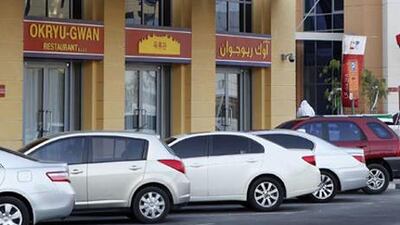DUBAI // It is like any other Korean restaurant on first impression, with cold noodles and a warm welcome.
The Okryugwan restaurant in Deira, however, is different in one respect: all the waitresses wear North Korean flags on their blouses.
The restaurant, which opened near the clock tower in June, is believed to be part of an international chain of eateries established by the North Korean government in what experts say is a bid to boost state coffers.
The country’s economy is hindered by sanctions relating to its nuclear weapons programme and its alleged sinking of a South Korean warship in March. In that context, the restaurants play a valuable role.
“The restaurants are a regime-supported way to earn foreign exchange,” said Marcus Noland, the deputy director of the Peterson Institute for International Economics and an expert on North Korea.
“It is a big deal to be sent out to operate one. Even the waitresses are screened for political reliability and their families back in North Korea face punishment if they defect.”
The majority ownership in the restaurant is held by an undisclosed local partner. The Chinese businessman Gavin Tang, who has worked in the Emirates for more than two decades, has said he also has a stake in the venture. Still, there’s no question about its management according to the manager.
“Everyone knows that it is run by the North Korean government,” said that executive, who identified herself only as Ms Jin. “A group of people from the foreign ministry direct the restaurant.”
Mr Tang agreed to act as a local fixer for the business after meeting Ms Jin at a franchise restaurant in Beijing, where she also worked as a manager. Though he denied North Korean officials were directing operations, he said there were “special people” taking care of them.
The chain has locations in Nepal, Thailand, Cambodia and China and recently opened in Amsterdam. The Dubai restaurant has become popular with Japanese, Chinese and Korean businessmen and is mentioned frequently on Japanese community message boards for the nightly cultural performance by its waitresses.
If only for one evening, the restaurant offers those who may never travel to North Korea a rare glimpse into its culture. The eatery is largely devoid of political references despite its communist sponsorship and soothing paintings of waterfalls and misty mountains adorn the walls.
A plasma television screen shows a video of exotic fish, which apparently runs on a loop, throughout the night. The saccharine keyboard music is replaced at 8pm by the waitresses’ performance, which includes multilingual karaoke singing and traditional fan dancing. All of the food is imported from North Korea, Ms Jin said, including the cold noodles for which the restaurant has become famous.
The restaurant chains allegedly have to turn a tidy profit. One such restaurant in China was obliged to make annual payments of as much as US$30,000 to the Pyongyang government or risk being closed down, according to reports from defectors.
The personnel are also purportedly under pressure to stay on the job. Several cases have been reported by The Daily NK, a news service run by North Korean exiles and human rights activists, where restaurants were closed after waitresses absconded to claim asylum in the countries where they worked.
“If there’s even a small default or lack of results then the threat of evacuation is given,” a former restaurant owner told The Daily NK during its investigation of the chain in 2007.
Ms Jin declined to comment last week on whether the profits from the restaurant were sent back to North Korea.
“Journalists shouldn’t ask such outrageous questions,” she said.
mcroucher@thenational.ae
chuang@thenational.ae

